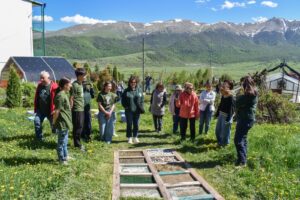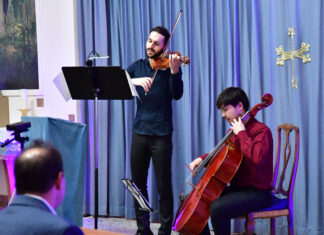By Magdalina Zatikyan
YEREVAN — Artsvi Bakhchinyan, an Armenian Studies scholar, researcher and translator based in Yerevan, brought to fruition a unique literary project. Zangak- 97 Publishing House recently printed a collection of 35 translations of one story. The name of the story is “The Hands,” written by Armenian writer and psychologist Elda Grin, well-known in intellectual circles of Armenia. The story was actually written in two languages: Armenian and Russian. Bakhchinyan arranged translations in 32 languages, including the European ones, as well as Chinese, Japanese, Persian, Arabic, Turkish, Hindi and Hebrew. He prepared also a version in Western Armenian, included as an appendix. All are compiled in the book of the same name.
Grin, who holds a PhD in psychology, has taught for many years in the Department of Psychology at Yerevan State University. For more than a half century, she has been immersed in literary life as an author of small stories. Her stories are full of intimate lyricism, psychological depth and thoughtful observation. Anton Chekhov’s famous line, “Brevity is the sister of talent,” certainly applies to Grin, whose small literary products often provide compelling life stories.
Elda Grin (Grigoryan) was born in 1928 in Georgia. From 1943 to 1947, she studied at Foreign Language Faculty of Yerevan Russian Pedagogical Institute. She has published eight books of short stories, among them: A Night Sketch (1973), My Garden (1983), We Want to Live Beautifully (2000), Space of Dreams (2004), etc.
“The Hands” is just four pages long, yet it embraces the life of an Armenian woman from the time of her marriage until just before gaining the status of grandmother. This deeply philosophical, moving story has an unusual background. It was penned in 1984 in a difficult period in Grin’s life, overshadowed by her husband’s illness. She was sitting next to him and recorded the story of a young Armenian woman who falls among harsh in-laws. “The Hands” was greeted warmly by readers, but soon this simple story underwent censorship by the Central Committee of the Communist Party of Armenia, where it was considered to be “not in conformity with party politics and government.”
But the fate of the story would be different. As Armenian writer Sero Khanzadyan had noted, “In literature there are many works on women’s hands. However, from this standpoint, Elda Grin was the first to tell the world about the beauty and strength of women’s hands and about the plight of Armenian women…” The story was translated into three languages in Soviet times. In 2007, Bakhchinyan received a proposal from the American journal Translation to submit a story from Armenian literature in English. Afterwards, he translated it into Swedish, in cooperation with his Swedish- Armenian friend, Aram Hellstadius. Then Bakhchinyan thought of collecting as many translations of the story as possible and publishing them all in one book. He wrote to many friends and acquaintances and asked them to participate in his project.







